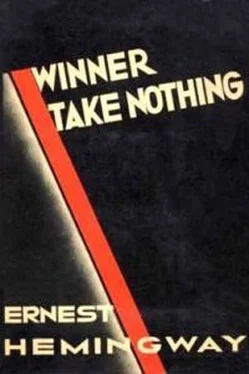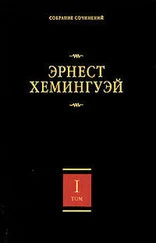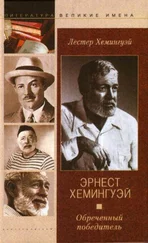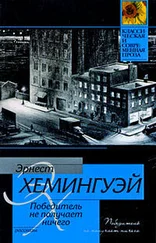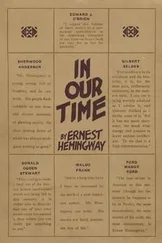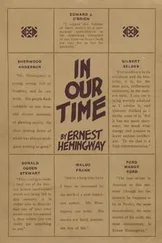In the mountains too, sometimes, the snow fell on the dead outside the dressing station on the side that was protected by the mountain from any shelling. They carried them into a cave that had been dug into the mountainside before the earth froze. It was in this cave that a man whose head was broken as a flower–pot may be broken, although it was all held together by membranes and a skillfully applied bandage now soaked and hardened, with the structure of his brain disturbed by a piece of broken steel in it, lay a day, a night, and a day. The stretcher–bearers asked the doctor to go in and have a look at him. They saw him each time they made a trip and even when they did not look at him they heard him breathing. The doctor’s eyes were red and the lids swollen, almost shut from tear gas. He looked at the man twice; once in daylight, once with a flashlight. That too would have made a good etching for Goya, the visit with the flashlight, I mean. After looking at him the second time the doctor believed the stretcher–bearers when they said the soldier was still alive.
“What do you want me to do about it?” he asked.
There was nothing they wanted done. But after a while they asked permission to carry him out and lay him with the badly wounded.
“No. No. No!” said the doctor, who was busy. “What’s the matter? Are you afraid of him?”
“We don’t like to hear him in there with the dead.”
“Don’t listen to him. If you take him out of there you will have to carry him right back in.”
“We wouldn’t mind that, Captain Doctor.”
“No,” said the doctor. “No. Didn’t you hear me say no?”
“Why don’t you give him an overdose of morphine?” asked an artillery officer who was waiting to have a wound in his arm dressed.
“Do you think that is the only use I have for morphine? Would you like me to have to operate without morphine? You have a pistol, go out and shoot him yourself.”
“He’s been shot already,” said the officer. “If some of you doctors were shot you’d be different.”
“Thank you very much,” said the doctor waving a forceps in the air. “Thank you a thousand times. What about these eyes?” He pointed the forceps at them. “How would you like these?”
“Tear gas. We call it lucky if it’s tear gas.”
“Because you leave the line,” said the doctor. “Because you come running here with your tear gas to be evacuated. You rub onions in your eyes.”
“You are beside yourself. I do not notice your insults. You are crazy.”
The stretcher–bearers came in.
“Captain Doctor,” one of them said.
“Get out of here!” said the doctor.
They went out.
“I will shoot the poor fellow,” the artillery officer said. “I am a humane man. I will not let him suffer.”
“Shoot him then,” said the doctor. “Shoot him. Assume the responsibility. I will make a report. Wounded shot by lieutenant of artillery in first curing post. Shoot him. Go ahead shoot him.”
“You are not a human being.”
“My business is to care for the wounded, not to kill them. That is for gentlemen of the artillery.”
“Why don’t you care for him then?”
“I have done so. I have done all that can be done.”
“Why don’t you send him down on the cable railway?”
“Who are you to ask me questions? Are you my superior officer? Are you in command of this dressing post? Do me the courtesy to answer.”
The lieutenant of artillery said nothing. The others in the room were all soldiers and there were no other officers present.
“Answer me,” said the doctor holding a needle up in his forceps. “Give me a response.”
“F—— yourself,” said the artillery officer.
“So,” said the doctor. “So, you said that. All right. All right. We shall see.”
The lieutenant of artillery stood up and walked toward him.
“F—— yourself,” he said. “F—— yourself. F—— your mother. F—— your sister….”
The doctor tossed the saucer full of iodine in his face. As he came toward him, blinded, the lieutenant fumbled for his pistol. The doctor skipped quickly behind him, tripped him and, as he fell to the floor, kicked him several times and picked up the pistol in his rubber gloves. The lieutenant sat on the floor holding his good hand to his eyes.
“I’ll kill you!” he said. “I’ll kill you as soon as I can see.”
“I am the boss,” said the doctor. “All is forgiven since you know I am the boss. You cannot kill me because I have your pistol. Sergeant! Adjutant! Adjutant!”
“The adjutant is at the cable railway,” said the sergeant.
“Wipe out this officer’s eyes with alcohol and water. He has got iodine in them. Bring me the basin to wash my hands. I will take this officer next.”
“You won’t touch me.”
“Hold him tight. He is a little delirious.”
One of the stretcher–bearers came in.
“Captain Doctor.”
“What do you want?”
“The man in the dead–house——”
“Get out of here.”
“Is dead, Captain Doctor. I thought you would be glad to know.”
“See, my poor lieutenant? We dispute about nothing. In time of war we dispute about nothing.”
“F—— you,” said the lieutenant of artillery. He still could not see. “You’ve blinded me.”
“It is nothing,” said the doctor. “Your eyes will be all right. It is nothing. A dispute about nothing.”
“Ayee! Ayee! Ayee!” suddenly screamed the lieutenant. “You have blinded me! You have blinded me!”
“Hold him tight,” said the doctor. “He is in much pain. Hold him very tight.”
It was a hot afternoon in Wyoming; the mountains were a long way away and you could see snow on their tops, but they made no shadow, and in the valley the grain–fields were yellow, the road was dusty with cars passing, and all the small wooden houses at the edge of town were baking in the sun. There was a tree made shade over Fontan’s back porch and I sat there at a table and Madame Fontan brought up cold beer from the cellar. A motor–car turned off the main road and came up the side road, and stopped beside the house. Two men got out and came in through the gate. I put the bottles under the table. Madame Fontan stood up.
“Where’s Sam?” one of the men asked at the screen door.
“He ain’t here. He’s at the mines.”
“You got some beer?”
“No. Ain’t got any beer. That’s a last bottle. All gone.”
“What’s he drinking?”
“That’s a last bottle. All gone.”
“Go on, give us some beer. You know me.”
“Ain’t got any beer. That’s a last bottle. All gone.”
“Come on, let’s go some place where we can get some real beer,” one of them said, and they went out to the car. One of them walked unsteadily. The motor–car jerked in starting, whirled on the road, and went on and away.
“Put the beer on the table,” Madame Fontan said. “What’s the matter, yes, all right. What’s the matter? Don’t drink off the floor.”
“I didn’t know who they were,” I said.
“They’re drunk,” she said. “That’s what makes the trouble. Then they go somewhere else and say they got it here. Maybe they don’t even remember.” She spoke French, but it was only French occasionally, and there were many English words and some English constructions.
“Where’s Fontan?”
“Il fait de la vendange. Oh, my God, il est crazy pour le vin.”
“But you like the beer?”
“Oui, j’aime la bière, mais Fontan, il est crazy pour le vin.”
She was a plump old woman with a lovely ruddy complexion and white hair. She was very clean and the house was very clean and neat. She came from Lens.
Читать дальше
Конец ознакомительного отрывка
Купить книгу
